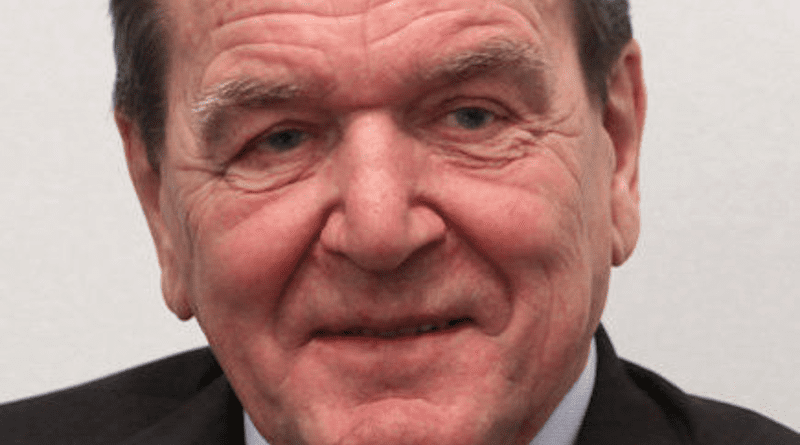EU Threatens Germany’s Former Chancellor Schröder With Sanctions For Russian Ties
By EurActiv
By Oliver Noyan
(EurActiv) — The European Parliament is increasing its pressure on former German chancellor Gerhard Schröder, threatening him with sanctions if he refuses to resign from his posts in Russian companies, a joint draft motion, seen by EURACTIV, suggests.
The joint motion is supported by MEPs from various political parties, ranging from Renew Europe, the EPP, and the Greens all the way to the S&D – Schröder’s political family. It calls on the Council to extend the list of individuals on the EU’s sanction list.
While some former European ministers have already stepped down from their position in Russian companies, the draft motion “strongly demands others, such as Karin Kneissl and Gerhard Schröder do the same.”
In the same paragraph, the document calls on “the Council to extend the list of individuals targeted by EU sanctions to the European members of the boards of major Russian companies, and politicians who continue to receive Russian money.”
Schröder is considered to be a long-term friend of Russian President Vladimir Putin and is chairman of the supervisory board of the Russian state energy company Rosneft. He was also one of the main brains behind Germany’s controversial Nord Stream 2 pipeline, for which he heavily lobbied in Berlin.
The other former European leader that the motion addresses is former Austrian Foreign Minister Karin Kneissl, who also sits on the Supervisory Board of Rosneft. She even invited Putin to her wedding in 2018 while she was still acting as Austrian foreign minister, and made headlines due to her “knee fall” to Putin while dancing the waltz with the Russian President.
Both politicians have failed to distance themselves from the Kremlin since the onset of the war in Ukraine. “I don’t do mea culpa,” Schröder told the New York Times in mid-April, adding “it is not my thing.”
Pressure is also mounting on Schröder on his home turf. The German coalition wants to cancel the former Chancellor’s current staff and office endowment in the Bundestag.
It is a long-standing tradition in Germany, that former chancellors still retain an office in the Bundestag, even after they have left the political scenery. The German coalition will bring a motion to the Bundestag on Thursday to decide on stripping Schröder of his office.
However, the coalition does not justify the step with Schröder’s entanglement with the Kremlin, but that he “no longer fulfils any continuing obligation from his office as former Federal Chancellor,” three MPs of the coalition parties explained on Wednesday.
Pressure from his own party is also increasing on Schröder, as multiple high ranking German politicians are calling for the expulsion of Schröder from the SPD.
For instance, German Interior minister Nancy Faeser told die Zeit on Wednesday that the former chancellor should be “expelled” from the party.
While Scholz himself has so far refrained from commenting on a potential part expulsion, in an interview with public broadcaster ZDF he advised Schröder to “retire from these positions”, regarding the former chancellor’s enmeshment with the Kremlin.

